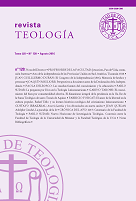The Knowledge of Good Through Affective Connaturality. The Integral Dynamism of Prudence in the IIa-IIae of the Summa Theologiae of Thomas Aquinas
Palavras-chave:
Connaturalidad, Afectos, Ley, Prudencia, Conocimiento moralResumo
This writing is a summary of a licenciate thesis. Its aim is to show in which way, in the moral life of the believer, inner taste when choosing how to act is decisive for happiness and salvation. Acting rightly is feeling rightly, and feeling rightly is not tantamount to a certain spontaneity indiferent to truth, and neither to mere external compliancy with natural, divine or ecclesiastical law. Without negating the importance of spontaneity as well as of the law, acting rightly entails, as a decisive criterion for discernment, an embodiment of moral truth as judged by therecta ratio. Such subjectivization is experienced as inner sweetness. At the same time, rightness of reason requires virtue, grace and the gifts of the Holy Ghost: we call this a judgment about goodness by affective connaturality or «per modum inclinationis».
Downloads
Downloads
Publicado
Como Citar
Edição
Secção
Licença
Direitos de Autor (c) 2018 Teología

Este trabalho encontra-se publicado com a Licença Internacional Creative Commons Atribuição-NãoComercial-CompartilhaIgual 4.0.














 Teología
Teología